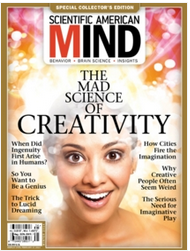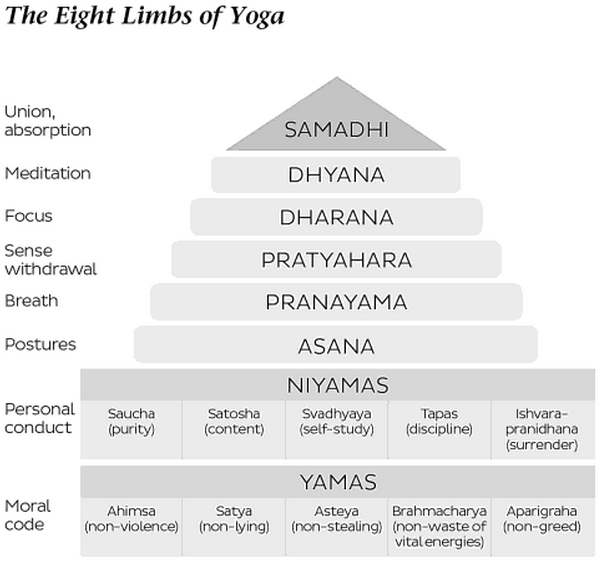Categories: Books, Cognitive Development Tags:
10 Minutes of Exercise Speeds up Your Thinking
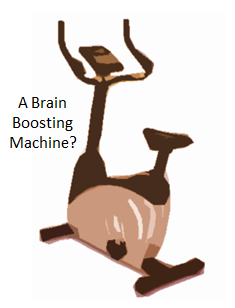 There is little doubt that physical exercise is a proven technique for both brain development and improving cognitive and emotional performance in real-time. There are many posts on the Next Brain blog that share the relevant research and techniques.
There is little doubt that physical exercise is a proven technique for both brain development and improving cognitive and emotional performance in real-time. There are many posts on the Next Brain blog that share the relevant research and techniques.
A recent post in the National Geographic, how 10 minutes of exercise gives your brain a boost, adds more weight to the point. Just minutes on a stationary bike produced an meaningful increase in the speed and accuracy of task-based thinking.
Fortunately, I have a stationary bike and have tested this technique many times. I will set my mind on a decision or problem and ruminate while riding. Useful insights are delivered about 30% of the time. Interested to hear from readers that may use this or a similar technique.
Categories: Other Tags:
Your Next Brain on Yoga?
There have been a handful of studies that suggest Yoga exercise and meditative practices can improve cognitive performance and brain function in adults and children. Just the kind of stuff we report on in the Next Brain Blog.
 One challenge in using Yoga as a cognitive development technique is that most approaches appear to be limited to what you can do on an exercise mat or in quite isolation. That’s one reason the book Yoga Wisdom at Work caught my attention. The authors, Maren and Jamie Showkier, demonstrate through stories and practical tips ways you can apply Yoga “off the mat and on the job”.
One challenge in using Yoga as a cognitive development technique is that most approaches appear to be limited to what you can do on an exercise mat or in quite isolation. That’s one reason the book Yoga Wisdom at Work caught my attention. The authors, Maren and Jamie Showkier, demonstrate through stories and practical tips ways you can apply Yoga “off the mat and on the job”.
While they include material on Yoga postures, exercise and meditation, they also cover other fundamental aspects of Yoga including for example, moral code and conduct. In total there are eight areas or limbs of Yoga that are presented providing a practical and comprehensive approach.
 I’ve partnered with Maren and Jamie to convert the how-to content in their book into a deck of knowledge cards that can be used to practice Yoga wisdom one small-step at a time on a daily basis. You can access the results on NewHabits a free iPhone and iPad App. NewHabits comes with two free decks of knowledge cards (motivation and observation) and the Yoga deck is $0.99. Additional decks of knowledge cards covering all eight limbs of Yoga are in the works.
I’ve partnered with Maren and Jamie to convert the how-to content in their book into a deck of knowledge cards that can be used to practice Yoga wisdom one small-step at a time on a daily basis. You can access the results on NewHabits a free iPhone and iPad App. NewHabits comes with two free decks of knowledge cards (motivation and observation) and the Yoga deck is $0.99. Additional decks of knowledge cards covering all eight limbs of Yoga are in the works.
I am interested to hear from readers that use Yoga to improve their cognitive abilities. What technique or limbs do you use?
Categories: Ancient Ways, Cognitive Development, Software Tags:
Learn New Motors Skills Just By Watching Video
 See one, do one, teach one is the best path to learning a new skill or so the old saying goes. But how much do you actually learn just by watching especially as you get older? Quite a bit, at least according to recent research to be presented at an upcoming meeting of the American Academy of Neurology.
See one, do one, teach one is the best path to learning a new skill or so the old saying goes. But how much do you actually learn just by watching especially as you get older? Quite a bit, at least according to recent research to be presented at an upcoming meeting of the American Academy of Neurology.
The study is discussed in a Science Daily blog post, Can You Boost Your Brain Power By Watching a Video? The findings are dramatic. Watching a video of how to perform a motor skill, improved performance by 11 times compared to a control group that watch videos on a topic unrelated to the motor skill (landscape videos). The researchers conclude:
“Our study lends credence to the idea that even as an adult, your brain is able to better learn skills just by watching the activity take place.”
While they tested on simple motor skills such as manipulating coins and cutting with scissors we are left wondering if it would work on more complex skills such as martial arts or drawing.
Categories: Other Tags:
How to Avoid Short Circuiting Your Thinking
 We are capable of great feats of thinking but we can also short circuit (mess up) how we perceive, remember, learn and make decisions on a regular basis. We all have these thinking foibles and scientist described them in various ways from decision traps to cognitive bias and heuristics of reason. For a quick overview of some of the biggest ones, check out five common mistakes your brain makes every day.
We are capable of great feats of thinking but we can also short circuit (mess up) how we perceive, remember, learn and make decisions on a regular basis. We all have these thinking foibles and scientist described them in various ways from decision traps to cognitive bias and heuristics of reason. For a quick overview of some of the biggest ones, check out five common mistakes your brain makes every day.
The post covers memory, expectations, loss aversion, stereotyping and predicting odds in simple terms and provides examples. What it does not provide (and most sources don’t) is ways to overcome or avoid them. For example, we are told that we trust our memories more than we should. We assume we remember events and experiences accurately when if fact there is good evidence that shows we distort and recreate them regularly. But what can you do? If I am not to trust my memory, what practical steps can I take to avoid the biases and mistakes of a faulty memory?
I am interested to hear from readers that have developed techniques to deal with unreliable memories, overbearing expectations or any of the other common mistakes our brain makes everyday. Such techniques should be a great way to improve our cognitive performance on a regular basis. Just what we want to discuss on the Next Brain Blog.
Categories: Other Tags:
Mental Performance Anxiety – Get Excited!
Most people experience performance anxiety. This includes all the feelings you have before and during a task you must do while others are watching and judging. How well we cope with these feelings often determines how well we do. Performance anxiety can be especially acute when the task we must perform involves thinking, learning, decision-making and other cognitive or mental performances. For example, knowing that you are going to have to “think on your feet” is often what worries people about public speaking.
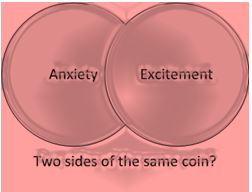 Learning to manage mental performance anxiety is critical for improving brain function and cognitive performance so it is a key topic on the Next Brain Blog. While we are often taught to try and calm ourselves down during bouts of performance anxiety, recent research indicates we may want to do just the opposite and jazz ourselves up. The idea is to reframe the energy associated with anxiety into a more productive state – excitement. As the researchers point out:
Learning to manage mental performance anxiety is critical for improving brain function and cognitive performance so it is a key topic on the Next Brain Blog. While we are often taught to try and calm ourselves down during bouts of performance anxiety, recent research indicates we may want to do just the opposite and jazz ourselves up. The idea is to reframe the energy associated with anxiety into a more productive state – excitement. As the researchers point out:
“Since both anxiety and excitement are emotional states characterized by high arousal, it may be easier to view anxiety as excitement rather than trying to calm down to combat performance anxiety…”
Start by using a simple affirmation – “I am excited” or “This is exciting because….”. Rather than resist feelings of anxiety step into the energy it offers by repeating simple but positive mental self-talk. It takes a bit of practice but it works.
I am very interested to hear from readers that have developed ways to get the most out of mental performance anxiety.
Categories: Mental Focus Tags:
Boost Recall by 50%+ Using Mnemonics
 A mnemonic is a way of organizing information to make it much easier to remember. Mnemonics are memorable representations we create to speed up learning. They are powerful and have been shown to work in a wide variety of settings. I am surprise they are not used more often.
A mnemonic is a way of organizing information to make it much easier to remember. Mnemonics are memorable representations we create to speed up learning. They are powerful and have been shown to work in a wide variety of settings. I am surprise they are not used more often.
There are several different types of mnemonics. For an excellent (and short) overview see the Nine Types of Mnemonics For Better Memory. The article covers using music, names, expressions, models, rhymes, note cards, images, connections and spellings to create more memorable representations of information. One of my favorite examples is the name mnemonic:
“ROY G. BIV = colors of the spectrum (Red, Orange, Yellow, Green, Blue, Indigo, Violet.)”
I learned this in grade school and have never forgotten it. The name, ROY G. BIV, sounds like a real name but it is unique making it very memorable. Each letter in the name can correspond to only one color so you can quickly reconstruct the entire spectrum, especially if you write the name down on a sheet or paper.
Creating good mnemonics can be a bit tricky. Just the act of trying to create a mnemonic engages us with the content and therefore speeds learning. It can make the task of memorizing more fun and if you create a powerful mnemonic you have something important to share.
Interested to hear from readers that developed their own mnemonics. Some good ones for remembering important facts about the brain would be especially appreciated.
Categories: Memory and Learning Tags:
Video & Photo Memories Impacting Your Brain?
 Most adults have watched thousands of hours of movies. I’ve often wondered how that impacts long-term memory. Do the movie memories mix with the real-world memories and change how we interpret the world, learn and make important decisions and judgments? I bet it does, big time, but I have not been able to find any detailed studies of the effects.
Most adults have watched thousands of hours of movies. I’ve often wondered how that impacts long-term memory. Do the movie memories mix with the real-world memories and change how we interpret the world, learn and make important decisions and judgments? I bet it does, big time, but I have not been able to find any detailed studies of the effects.
I did recently see a study on how taking photographs of an object can impact memory for the object. According to point-and-shoot memories, if you take a picture of an entire object you are less likely to remember details about it. However, if you zoom in on a part of the object and take a photo of the details, your memory is unaffected. The study concludes:
“This finding highlights key differences between people’s memory and the camera’s “memory” and suggests that the additional attentional and cognitive processes engaged by this focused activity can eliminate the photo-taking-impairment effect.”
With cameras in our phones and popular ways of manipulating sharing photos (e.g. Facebook, Instagram, Flickr, Pic Stich, and Pinterest) camera memories are becoming a significant part of our Next Brain.
Categories: Memory and Learning Tags:
Can Mother’s Exercise Boost Baby’s Brain Maturity?
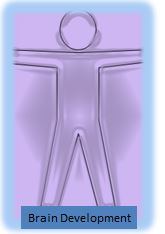 I regularly get emails from parents asking what they can do to help improve their kid’s brain function and cognitive performance. I offer plenty of tips in the Next Brain blog but am always on the look out for more.
I regularly get emails from parents asking what they can do to help improve their kid’s brain function and cognitive performance. I offer plenty of tips in the Next Brain blog but am always on the look out for more.
For example the New York Times has an interesting article about a research study that suggests as little as one-hour of exercise per week while pregnant can have a pronounced impact on how a new born’s brain processes stimulus.
“their brains were more mature,” Ms. Labonte-LeMoyne said.”
The study cautions that it is not clear if other factors are at play or if the relative advantage will persist as the child develops. The researcher conclude:
“But for now, the lesson is clear. “If a woman can be physically active during her pregnancy, she may give her unborn child an advantage, in terms of brain development,” Ms. Labonte-LeMoyne said. And the commitment required can be slight.”
I am interested to hear about other research studies that examine the impact of exercise (or lack of it) by a mother on her baby’s brain function and cognitive performance.
Categories: Child, Cognitive Development, Parent Tags:
Just How Smart are You?
Mensa is a well-known organization for highly intelligent people. To get in you need to score in the top 2% of a standardized intelligence test. There are about 57,000 members in the US. I hope they are reading the Next Brain Blog!
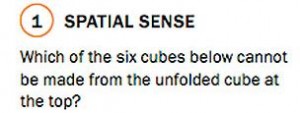 Each year the organization runs a national games competition called Mind Games. It is clear they are big on games as a way to test and boost intelligence. Check out their all ages Game Room. If you want to see how you would stack up, try out this 9-question sample (including answers), offered by Scientific American.
Each year the organization runs a national games competition called Mind Games. It is clear they are big on games as a way to test and boost intelligence. Check out their all ages Game Room. If you want to see how you would stack up, try out this 9-question sample (including answers), offered by Scientific American.
I am interested to hear from readers that are Mensa members. What tips can you share for improving brain function and cognitive performance?
Categories: Cognitive Development Tags: games

